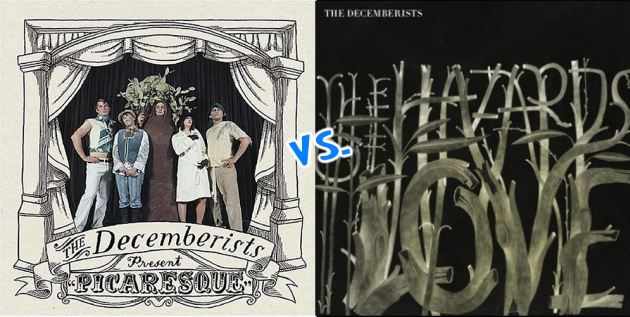
Versus is a new series in which we pit selected albums against one another and offer case statements for which is superior. In this, our first installment, we examine two albums from the same artist’s catalog — The Decemberists’ Picaresque versus The Hazards of Love — and we ask: which do you think is the better album?
Picaresque (2005)
Unleashed with the aboriginal shriek of a shofer, Picaresque will forever be the gold standard against which all The Decemberists’ offerings are measured. In crafting an escapist reality with anachronistic imagery and the bombastic bravado of singer-songwriter Colin Meloy, Picaresque was a major force in reviving the Pacific Northwest music scene from the chilled embers of grunge rock.
Set to tragic violin lines simultaneously evoking impending doom and the blinding ecstasy of love, “We Both Go Down Together” presents a couple struggling in vain to steer fate’s turbulent current. Unable to reconcile his girl’s tainted past as a “tattooed tramp” with the stifling expectations of an elitist patriarch, the lovers are driven to the twisted salvation of simultaneous suicide: “And while the seagulls are crying / We fall but our souls are flying.”
“Sixteen Military Wives,” an anthemic rebuke of both neoconservative foreign policy and the media’s fundamentally acquiescent response, weds triumphant horns with the frantic rhythmic punch of a crisp snare drum. Backed by a majestically swirling organ, Meloy belts: “And America does / If America says it’s so / It’s so! / And the anchorperson on TV / Goes la-di-da-di-da-didi-didi-da!”
Up-tempo “The Sporting Life” is an endearingly self-conscious ditty about athletic competition seen through the eyes of an uncoordinated outsider. Atop a melancholy accordion and twinkling piano, “The Engine Driver” reminds us of those rigid hierarchies that determine the course of our lives. Decrying free will and social mobility as cruel lies, the singer laments: “I’m a county lineman… So will be my grandson / There are power lines / In our bloodlines.”
Rounding out the album is sinister, brooding gypsy rock number “The Mariner’s Revenge Song,” which maintains a high level of energy and intrigue through the track’s eight-minute saga of naturalistic calamity, exploited kindness, and masochistic retribution.
Picaresque put Portland back on the map; kick started the Third Rock Revival, and endowed The Decemberists with a legacy few indie groups have achieved since. Notwithstanding the novelty of their progressive rock opera The Hazards of Love, Picaresque is Meloy’s seminal album and perhaps the most elegantly structured, lyrically dramatic, and vocally expressive folk-rock LP of its decade.
– Henry Hauser
The Hazards of Love (2009)
With all due respect to the fantastic balance of The Decemberists’ work, The Hazards of Love isn’t just their best record, but one of the finest of the last decade. That it has become this sort of lightning rod amidst their canon is staggering, borderline incomprehensible to me. Sure, it was a different sound and concept than they’d ever levied before, but they hit every mark flawlessly.
Conceptually, you’d be hard pressed to find a more thoroughly composed album not just in their own catalog, but anywhere, period. The story might be a little bit fantasized, but that’s always been Colin Meloy’s writing style. Besides, the story is only as narrow as the listener’s imagination and ability to relate fables to life. There’s a reason sensationalized children’s books manage to stand the test of time; their messages, subtle as they may be to children, are equally powerful to adults. Hazards might be about shape-shifting forests and fairies on the surface, but there’s hidden meaning in literally every word and every note of the album. And that’s where it becomes such an easy record to fall in love with.
One of the most common complaints about The Hazards of Love – beyond the camouflaged ire of fans bitter that a treasured indie band had made what amounts to a stadium rock opera – is that, as great as it plays as an album, it struggles in terms of individual songs. But I couldn’t disagree more. Every song on this record, even down to the instrumental interlude, is as magnificent as a single dangling thread as they are amongst the whole effort quilted tightly together. “The Wanting Comes in Waves/Repaid” becomes more and more jarring each time you hear it and “The Hazards of Love 4 (The Drowned)” – my god, that song – is literally one of the greatest love songs in the history of music. I genuinely can’t fathom being able to listen to that song without feeling as though someone just lit a match and is holding the flame up tight against my heart.
Picaresque is an amazing record. From the songwriting to the arrangements, there’s absolutely nothing in those 11 songs that warrants complaining. But The Hazards of Love is in a class all its own. Meloy’s songwriting is every bit as powerful, sophisticated, and ingenious as ever, the guest vocals and characters lended by Becky Stark and Shara Worden are perfect accompaniments, and the full band really stretches themselves and their compositions; the way the whole album bleeds together is something to marvel at. Rarely is an album perfect, but Hazards is one monumental accomplishment that is.
– Andrew Bailey
Which of these two Decemberists albums do you most prefer? Drop us your vote in the comments below.

